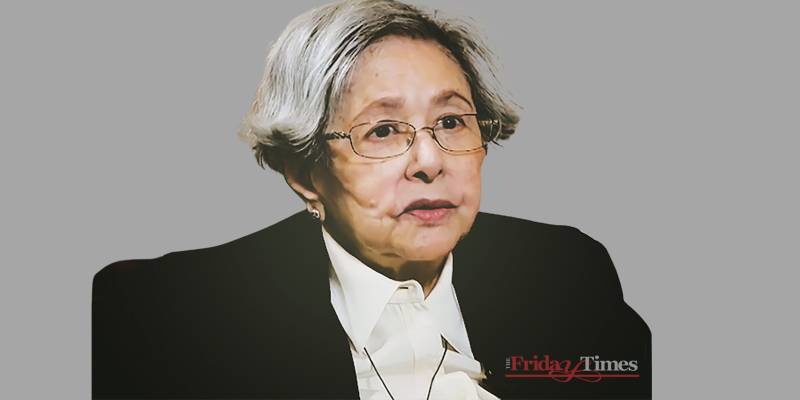
Modern English literature of today has been enriched by non-English speaking writers from India and Pakistan. Authors like R.K. Narayan, V.S. Naipul, Anita Desia, Ruth Prawar Jhabvala, Aravind Adiga, Vikram Seth, and Arundhati Roy have written some masterpieces of English Literature. This list cannot be complete without the name of renowned Pakistani author and literary icon Bapsi Sidhwa who passed away in Houston Texas USA on the 26th of December 2024 at the age of 86. Bapsi was a popular and celebrated novelist of the modern age and her contribution to English literature and language has left an indelible mark on modern literary landscape.
Her departure from the world is an irreparable loss for Pakistan; and her Zoroastrian community has lost a great icon. Bapsi became world famous and gained international acclaim for her many novels especially when she joined hands with the Canadian Filmmaker Deepa Mehta. Her Novel Ice Candy Man written in 1991was the basis of the award-winning film Earth in 1998. Her Novel Water was the basis of the Film Water by Mehta which was nominated for the Academy Awards. Through her deeply evocative and popular writings, she managed to spin tales combining history, culture, and her personal experiences making her one of the most celebrated authors of her time. Bapsi: Silences of My Life a documentary released by the Citizens Archive of Pakistan was released in 2022. The film explores her journey as a writer and how the traumatic experiences of the partition of India significantly influenced her literary perspective.
Bapsi Sidhwa was born on 11th August 1938 in Karachi in a prosperous Zoroastrian (Parsi) family. Three months after her birth the family shifted to Lahore where she spent her childhood and contracted polio at the age of two. This was a defining moment that shaped her resilience and outlook towards life. The traumatic events and horrors of the partition of India left an indelible impression on her. A chilling encounter with a corpse hidden in a sack would later inspire key themes in her ground-breaking novel Cracking India.
Bapsi Sidhwa completed her education after graduating from Kinnaird College Lahore in 1957 and then started her writing career. All her writings are a vivid description of South Asia’s cultural and historic tapestry. She was married at the young age of 19 and moved to Bombay with her husband where she gave birth to a daughter and then a son but the marriage came to an end after five years and she had to move back to her parents in Lahore but her son remained in Bombay with his father. Sidhwa eventually remarried in Lahore to her husband, Noshir, who was also a Zoroastrian. She had three more children. One of her children is Mohur Sidhwa, who is a candidate for state representative in Arizona.
In 1986 she received the Bunting Fellowship at Radcliff/Harvard, was appointed Visiting Scholar at the Rockefeller Foundation Center Bellagio, Italy in 1991, Sitara-i-Imtiaz awarded by the Govt. of Pakistan in 1991, Lila Wallace Readers Digest Award in 1994 and was also inducted in the Zoroastrian hall of fame in 2000
Later, Bapsi Sidhwa moved to Houston, USA. She insisted on calling herself “Punjabi-Parsi.” Her mother tongue was Gujarati and she was fluent in Urdu and English. After a fellowship at Harvard University, she got her first job at Columbia University where she taught fiction writing to graduate students. She did complain about panic attacks before lectures when she began teaching due to lack of practical experience but eventually she became a popular and respected professor. Sidhwa left Columbia after one academic term and started living in Houston, teaching at the University of St. Thomas before eventually teaching at Rice University's School of Continuing Studies. Sidhwa also taught at the University of Houston, Mount Holyoke College, and Brandeis University.
During her illustrious career, Bapsi Sidhwa received numerous awards citations, and accolades. In 1986 she received the Bunting Fellowship at Radcliffe/Harvard, was appointed Visiting Scholar at the Rockefeller Foundation Center Bellagio, Italy in 1991, received Sitara-i-Imtiaz by the Government of Pakistan in 1991, and Lila Wallace Readers Digest Award in 1994. She was also inducted in the Zoroastrian hall of fame in 2000.
Bapsi Sidhwa had a lifelong love affair with the city of Lahore where she grew up and received her education. Lahore happens to be at the center of her four books Their Language of Love, Jungle Wala Sahib, City of Sin and Splendor: Writings on Lahore. Her other works are An American Brat and Bapsi Sidhwa Omnibus. Her five novels: Cracking India, The Pakistani Bride, The Crow Eaters, An American Brat, and Water have been translated and published in several languages. Her novels reflect her personal experiences of witnessing Indian subcontinent’s partition and mistreatment of women. In 1978, at a time when publishing in English was practically non-existent in Pakistan, Sidhwa self-published her novel The Crow Eaters. Sidhwa’s first three novels, although very different from one another, share what Anita Desai has described as a 'passion for history and truth-telling'.
Sidhwa believed that to understand any single event it was necessary to consider the events which led up to it. The partition of India is a sensitive subject. The events around partition have been presented differently by the authors of India and Pakistan. These authors either advocate the Muslim viewpoint or the Hindu viewpoint. Sidhwa, as a Zoroastrian, was far more realistic and objective. In the sixteenth chapter of Ice Candy Man, Sidhwa presents what happened in Lahore, how the people lost their reason and murdered their fellows inhumanly.
Her unique voice and crisp writing make her perhaps the greatest Pakistani writer in English. May she rest in peace.

